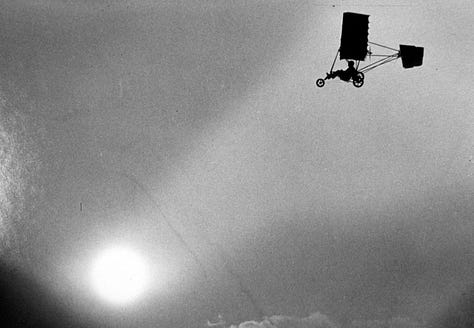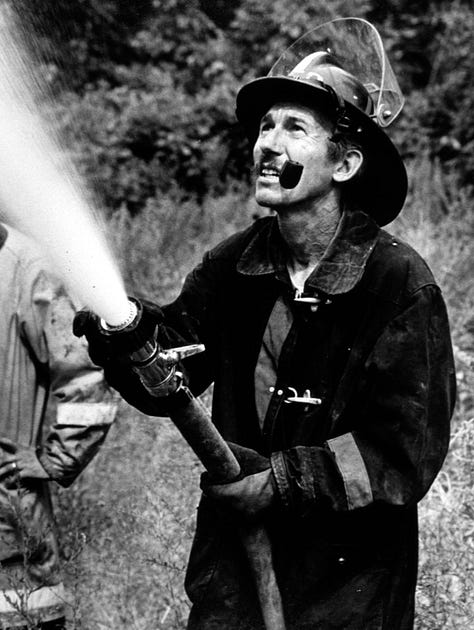The Experimental History experiment
Going whole hog on the blog
A year ago, I started a blog.
I called it Experimental History, which is a dumb name for a blog that’s not really about history.
It’s important to set goals, so I said out loud, to no one, “If 500 people regularly read what I write, that would be pretty cool.”
A year later, 14,500+ people have entrusted me with their email addresses.
As we say in the Midwest, “oh jeez!”
THANK YOU FOR LETTING ME VISIT YOUR HEAD
Whenever I get stuck while writing a post, I tell myself, “just say the most honest thing,” and that gets me unstuck. So here’s the most honest thing.
I love writing this blog. I go to sleep thinking about it, I wake up thinking about it, and I dream about it in between.
Two things keep me coming back, which I can only describe as cognitive sneezing and interior design for your head.
You know that feeling you get when you have to sneeze, and all you can think about is how much you have to sneeze, and then you sneeze a big glorious sneeze, and for half a second you have this perfect sense of calm, like everything is right in the world because you sneezed?
Writing this blog is like that, just with ideas instead of sneezes. I get something caught in my head and I just have to get it out, and the only way to do that is to figure out what it’s all about. Once I sneeze it out of my head and onto the page, I feel at peace.
The second reason: have you ever had a very clever friend come to visit, and they sit in your living room and they go, “You know, I think you’d actually like this room a lot better if you arranged it like this.” And you push the sofa and chairs around and darn it, it is better like that.
A good idea is like that, but for the furniture inside your head. I've had my cognitive furniture rearranged by so many clever visitors, lots of whom were strangers writing words on the internet. I owe them a great debt, and the best way I can think to pay it is to try to be a helpful visitor in other people’s heads, too.
Of course, the host gets final say. Sometimes you move the recliner over here and the TV over there and you go, “ah, I actually liked it better the other way.” That’s useful too, knowing that you’ve got things arranged the best way you could think of. So I don’t write in the hopes of convincing everyone to agree with me—a world where everyone agrees with me would be extremely frightening and I’d want to leave immediately. Instead, I write in the hopes of giving people something worth agreeing or disagreeing with.
RUNNING OUT OF RUNWAY
This past year has been great, but I’m on borrowed time. So far, I’ve been able to blog because I have a temporary academic job where no one stops me from writing words for free on the internet instead of writing words for paywalled journals. But that’s coming to an end, and my options are a) try to become a professor and squeeze the blog in between publishing/perishing, or b) to leap and hope the internet catches me.
I’m gonna leap!
As of today, you can sign up for a paid subscription to Experimental History. With your support, I can keep doing research and writing essays and keep sharing them with you.
In return for subscribing, you’ll get occasional MYSTERY POSTS. These will take a lot of different forms: a peek behind the scenes, an idea that didn’t make it into a post, an interview with someone I want to get to know better, an excerpt from the weird meditation podcast I used to make. I already have some things in the works that I’m excited to share with you.
My scientific work and longer essays will always be open to everybody. Subscribing to this blog isn’t like subscribing to The New York Times, where you pay a big, faceless corporation to lower the annoying paywall that surrounds their content. This is patronage; it's voting with your dollars for the kind of world you want to live in.
HOW’S THE EXPERIMENT GOING SO FAR?
If you’re willing to support this experiment, you ought to have some idea of how it’s going. So here’s a little retrospective of the most-viewed Experimental History posts from its first year of life.
When I hit “submit” on this one, I immediately thought, “This is a pretty niche topic, I bet not a lot of people will read this one.” It then became my most-read post of all time, which is further evidence for the central conceit of this blog: I'm a big dummy and I don't know anything. Many commenters pointed this out as well.
This is me being the change I want to see in science: honestly explain what you did, post all the data, code, materials, etc., and write it in words that anyone could understand. I thought maybe no one would care or they wouldn’t take the paper seriously. Instead, lots of people read it and wrote in with feedback, including lots of folks from outside academia, who we never would have heard from otherwise. Ethan and I then improved the paper in response, and anyone who gave us a helpful comment is now thanked at the end. Expect more of this on the blog this year.
This essay was, for me, a crash course in the internet. I posted this back in February, when I had 311 subscribers. Months later, someone found it and posted it on Hacker News, which is kind of like Reddit but for nerds, and now has over 100,000 views. It goes to show that anything you write on the internet could randomly get a lot of attention, even when you’re just some dude sending emails to your friends. This makes me hopeful and terrified.
One sad addendum to this post: my grandma, who I mention at the end of the essay as someone with a lot of intelligence that wouldn’t be measured by an IQ test, passed away a few weeks ago. Rest in peace, grandma. You gotta be pretty darn smart to live a life as good as yours.
I used to sit down at my computer to do my academic work and be like, “Time to do the work I love! I just need to fill myself with caffeine, set a deadline, start a Pomodoro timer, turn off my phone, close my browser, slap myself in the face while telling myself what a lazy good-for-nothing I am, and that’ll ensure that I stay on task.” Then I had the most obvious thought of all time: if I love doing this so much, why do I have to force myself to do it? This essay is the result of me trying to figure that out.
The rest of the top ten are other highlights from this past year, like Pop culture has become an oligopoly, where I analyzed a bunch of data and found that more and more of the most-consumed movies, music, TV shows, books, and video games are increasingly sequels, prequels, reboots, reruns, etc. There’s also You’ll forget most of what you learn. What should you do about that?, which could’ve used a better title, but what do expect when the name of this blog is the clunky and un-nickname-able Experimental History? (What do you call this thing for short? EH?) And then come two of the posts that got me the most worked up when writing them: Psychology might be a big stinking’ load of hogwash and that’s just fine, and Reading the news is the new smoking. Ironically, the news post got me interviewed on a Canadian news show.
Along the way, I got to use some of my dad’s photos from when he was a photojournalist in the 1980s. Here are some of my favorites:









THE FOOL’S DREAM
Last March, when I had barely begun blogging, I happened to meet a big shot author who writes pop science books, and I told him about my dreams for this blog. "Maybe this could be what I do," I told him, hopefully.
“It’ll never work,” he said. "People want to read about what they are interested in, not what you are interested in. I’m successful because I write stuff that will sell. I don’t actually like the stuff I write about.”
I felt pretty embarrassed, like I had just told him that when I grow up, I want to be a unicorn. “Maybe, um, maybe there’s actually a lot of people out there who are interested in the same stuff as me!” I suggested, sheepishly.
He wasn’t listening because he had just pulled up my most recent post and was skimming it. “I’m sorry, but this isn’t good enough. Don’t quit your day job."
I’m making him sound like a villain because that’s how it felt at the time, but he was really trying to help me out. He saw a nice kid with a bright future who was about to throw it all away on a fool’s dream. But he underestimated how much I believe in that dream.
I dream of a world where scientists do their work in public for the benefit of everyone, rather than locking it away in the ivory dungeon of academia. A world where we try to discover truth rather than trying to get papers published. A world where, whoever you are and whatever credentials you have, you can figure out something useful about the universe. That world won’t just happen; somebody’s gotta make it happen.
That means someone has to be dumb enough to go first, and I guess that’s me. But I’ll be damned if I’m the last. I intend to build a world where others can live too, and this is just the first step.
Experimental History isn’t just a silly name for a blog. It’s the idea that all of human history is one big experiment. The independent variables are the choices we make today; the dependent variable is the future we get tomorrow. This is my tiny part of that experiment, and I think it’s shown some promising results so far. I won’t stop now, and I won’t stop ever. I hope you’ll come with me.



It’s been a low key dream of mine that people could just start doing science in new ways, without waiting for anyone’s permission.
Reading Experimental History has been a thrill because it feels like a step towards that.
It’s also fun as heck to read. Malcolm Gladwell (or whoever) can go boil his head.
Good luck! You have become one of my favorite Substack writers and I hope this blog prospers.